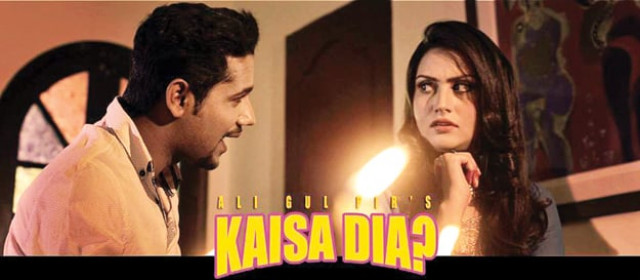Too little, not too late
Ali Gul Pir’s ‘Kaisa Dia’ jests at the mixing of religion and commerce on TV in the new spate of game shows.

Television has done considerably well with theme songs, especially in sitcoms. Friends comes to mind, so does Happy Days and WKRP in Cincinnati. Among my favourites is The Fresh Prince of Bel Air’s theme song, a tongue-in-cheek introduction to the show and its tone of voice. Ali Gul Pir’s rapping style always reminds me of it; it has the same relaxed delivery, cheeky content and satire. This brings me to his latest song and video, Kaisa Dia, which is, ironically, about TV in Pakistan.

I quite like Kaisa Dia because Pir has managed to create characters that, after those in Wadere Ka Beta and Taroo Maroo, feel familiar to observation, and has managed to bring in some great lines that capture the zeitgeist of the moment. The song and video parody the likes of Aamir Liaquat, commercialism and the TV, film and music industries. Like in all his previous works, Pir’s gifts as an actor and his unique physicality in making dance moves hysterically funny come out strong.
There are some standout lines in the song, particularly, “Aik haath emaan do, brand new car lo,” for the mixing of Islam and commerce on TV in the new spate of game shows during the religious calendar. Another one that registers strongly is when his character is trying to seduce a female actor by saying, “Chaat – haath se banaunga, khilaoonga, bolay tou Deepak se dress bhi silwaoonga.”
Pir’s inventiveness in creating non-sequiturs makes one chuckle as he reduces the characters he lampoons into absurdity. Musically, too, in this song, as in several others, he keeps the rapped verse structure with a melodic chorus. Kaisa Dia is as strong as Wadere Ka Beta, even though Kaisa Dia is eastern classically delivered.
Despite my fondness for the song and video, I feel the breakdown of the song into three different story arcs and characters was too much for such a short and tight song. One distinctly felt that more of the Aamir Liaquat character should have been explored.

The timing of the release of Kaisa Dia is unfortunate because the topical interest in Aamir Liaquat has moved from the commercialisation of religion to the hate speech he allows on his programme. The song was obviously done before recent events, and if one doesn’t know that there is the uneasy feeling that something of significant import has been overlooked.
As a musical satirist, Pir has a certain talent. He is able to take the object of derision and make it oddly sympathetic. It is something he achieved with Wadere Ka Beta in particular, where he took the affectations of that class of appropriators and brought out just how out-of-sync they are, especially in relation to how they see themselves, making them both endearing and deplorable.
It is this aspect of his work that makes his output entertaining. He did the same to oglers in his song Taroo Maroo. Despite oglers being the bane of women in the country, one feels an uneasy sympathy for the man whose unwanted gaze is a result of his gross misunderstanding of women, insensitivity and an utter lack of self-control.
Will Ferrell’s portrayal of George W Bush in Saturday Night Live had a similar effect. The sketches were derisory and satirical, but one developed an odd affection for the character. For a satirist, this is a strange place to be in. The answer to this particular problem can be seen in Pir’s song VIP.

It is a relatively straight takedown of politicians and VIP culture, where the venom of the satirical is strong, and is his least artistically strong effort. One doesn’t feel any affinity for the lead character in it because there are no redeeming features to him. In addition, Pir has a gift for coming up with lines that make their way to common conversation, such as “Saeen ki moochain bhi saeen” but in VIP, that’s scarce.
This speaks to the strengths of Ali as an artiste. He has been able to establish a distinct voice that humanises the subjects of his satire, not through sympathy but through voicing their delusions. VIP is a song where he appears to have gone against the grain and it doesn’t work.
Pir’s strong suit is writing satire about universal truths, which is what makes Wadere Ka Beta and Taroo Maroo enduring. Kaisa Dia has the same flavour, but the topicality of the current news surrounding his subject matter has compromised the way it’s viewed. I think that a year down the road, it will be seen for what it is – a spot-on takedown of the entertainment industry. And its particular satirical strength is explaining the new wave of religious programming as commercially-driven exploitation TV.
Published in The Express Tribune, January 6th, 2015.
Like Life & Style on Facebook, follow @ETLifeandStyle on Twitter for the latest in fashion, gossip and entertainment.



















COMMENTS
Comments are moderated and generally will be posted if they are on-topic and not abusive.
For more information, please see our Comments FAQ